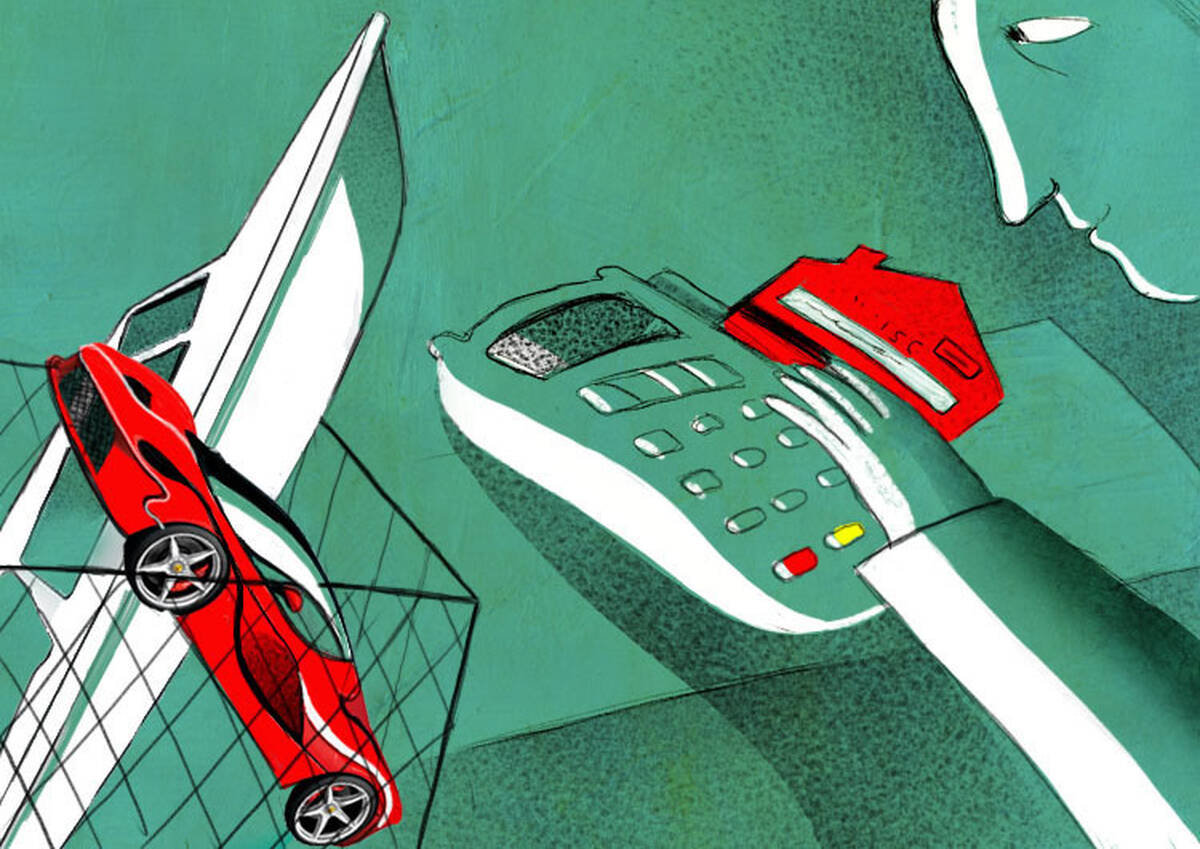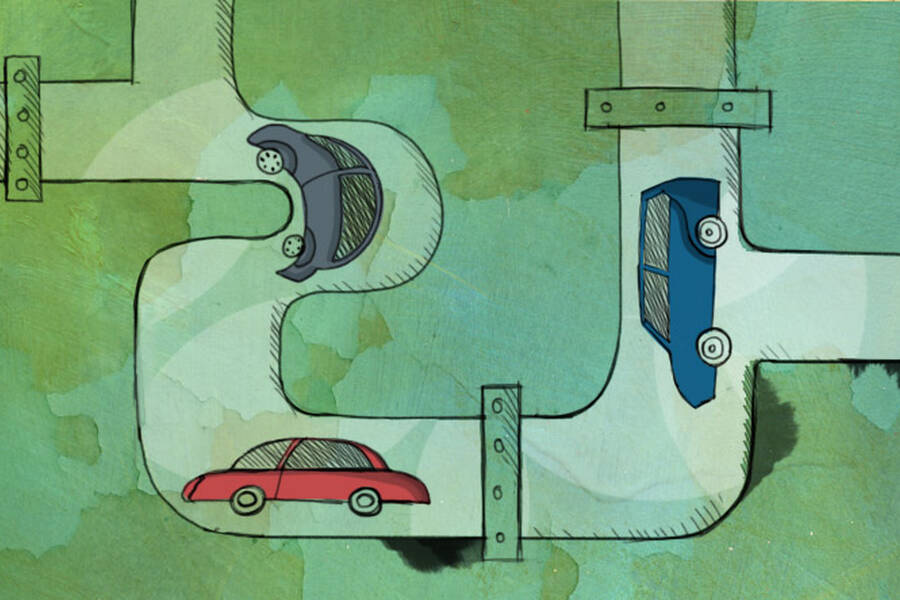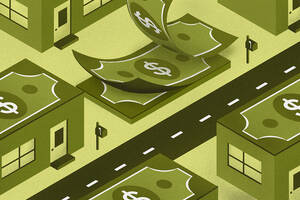Finance & Accounting Economics Feb 3, 2017
Why Are We So Quick to Borrow When the Value of Our Home Rises?
The reason isn’t as simple as just feeling wealthier.

Yevgenia Nayberg
With the benefit of hindsight, it’s easy to tut-tut at the bubble-driven thinking of certain homeowners prior to the Great Recession. Of course it’s ludicrous to use your home as an ATM to purchase that boat or RV you have always wanted but could never have otherwise afforded.
Yet this is not a phenomenon restricted to economic bubbles. Whenever home values rise, homeowners take out more debt. It is as inevitable as gravity. The question is: Why?
Economic theory offers two explanations, the first of which—the “wealth effect”—works exactly how it sounds. “You just feel richer,” says Kellogg assistant professor of finance Anthony DeFusco. “You own this thing that’s now worth a lot more money, so you feel like you can carry more debt.” This could be credit card debt, but also a home-equity loan that uses your home as collateral.
The second explanation, not mutually exclusive, is called the “collateral channel.” This explanation has more to do with the increased access to credit that rising home values create. Rather than making homeowners feel and act wealthier, the collateral channel encourages homeowners to take advantage of the fact that they can take out larger loans on better terms because the on-paper value of the collateral—their home—has increased.
Think of it as the difference between a winning lottery ticket and an improved credit score. “The main way that most people get access to large amounts of credit is by borrowing against their house,” explains DeFusco. “The collateral channel explanation is not so much about you suddenly wanting to borrow more because you think you’re richer; it’s that you’ve always wanted to borrow more, and now you’re just able to—regardless of your wealth status.”
“All of this housing debt isn’t so bad during a boom. But if you’re acting this way during a time of unrealistic expectations ... then it can make the consequences of the bust much much worse.”
So is the wealth effect enough to explain jumps in homeowner borrowing? Or does the collateral channel also contribute? In new research, DeFusco uses evidence from a clever natural experiment to determine that the collateral channel plays an important role.
Switching Off the Wealth Effect
According to DeFusco, homeowner borrowing is influenced by a mixture of wealth effects and the collateral channel. But the two mechanisms can be difficult to tease apart. This is problematic, as each has different implications for how changes in housing prices will affect the economy at large.
For one thing, the wealth affect—but not the collateral channel—can be somewhat offset in economies with lots of renters.
Increases in housing prices do not have the same impact on renters as on homeowners. For renters, says DeFusco, “the wealth effect that is associated with rising house prices is actually negative; it simply represents an increase in their cost of living. ” After all, anyone hoping to purchase a home in the future effectively loses wealth as home value rises, as they will have to pay more in the future for the same home. Those renters are then incentivized to take on less debt, offsetting the tendency of homeowners to take on more debt. This might mean that, in aggregate, a change in housing prices has little impact on debt.
In contrast, if increased access to credit is the primary driver of homeowners’ tendency to assume more debt as home values rise, this offsetting effect does not occur—meaning that a boost in housing prices should lead to more debt in the economy at large.
A Clever Natural Experiment
So what is the relative impact of the collateral channel?
In order to find out, DeFusco consulted a unique dataset from Montgomery County, Maryland, where developers are required by law to sell a portion of all new housing units at artificially controlled prices so that moderate-income families have a shot at purchasing them. The law prevents those moderate-income households from refinancing the units or taking out home-equity loans based on the homes’ normal market rate. Otherwise, it really would be like offering “free money” to these homeowners—they could purchase the houses at below-market rates and then extract cash from them by taking out loans based on the homes’ real market value.
Critically for DeFusco’s research, however, once the artificial price controls expire—which happens anywhere from 5 to 30 years after purchase—these homeowners are allowed to use the full market value of the units as collateral for home-equity loans.
The peculiarity of this local housing market regulation let DeFusco precisely measure how individual household borrowing behavior changed when the price controls expired and the collateral value of the homes literally changed overnight.
“These people would own the exact same house today and tomorrow,” DeFusco says—which means that no wealth effects were influencing their borrowing behavior—“but between today and tomorrow, their ability to borrow against that house would change significantly.” In other words, Montgomery County’s housing law acted like a switch that could “shut down the wealth-effect channel,” leaving only the collateral channel in play.
Cents on the Dollar
So what changed when the switch flipped? “For every extra dollar of house value, these homeowners will borrow about 4 to 13 cents more,” DeFusco says.
To put this in perspective, other work, which has not been able to fully separate the two channels, has found that the wealth-effect and collateral-channel influences combined lead homeowners to borrow 5 to 25 cents more for every extra dollar of home value. “It’s hard to compare these figures directly,” DeFusco says, “but it suggests that a meaningful fraction of this increased borrowing behavior is due to the collateral channel.”
This suggests that an increase in home value acts in part like an increase in the homeowner’s credit score. Loans that the homeowner may have always wanted to take out but wouldn’t or couldn’t because the terms were unfavorable, now become feasible—for example, taking out a home-equity loan in order to upgrade the house’s energy efficiency. Unsurprisingly, many homeowners seize this opportunity.
The findings provide persuasive evidence that changes in housing prices are “not just a side effect” of what happens in the macroeconomy, says DeFusco. The collateral channel’s effect on increasing homeowner debt—which is not offset by the same tendency of renters to decrease their borrowing—means that the behavior of the housing market can act as an amplifier on other kinds of activity in the economy at large, such as household spending. As house prices rise, households borrow more, which can lead to a debt-driven consumption boom of the type witnessed during the run-up to the Great Recession.
“This type of amplification mechanism is important for central banks to consider in conducting monetary policy,” DeFusco says—whether we’re in the midst of a housing bubble or not.
“Homeowners are going to do this no matter what, and all of this housing debt isn’t so bad during a boom,” he adds. “But if you’re acting this way during a time of unrealistic expectations, where everybody thinks that house prices are just going to keep going up forever, then it can make the consequences of the bust much much worse.”



